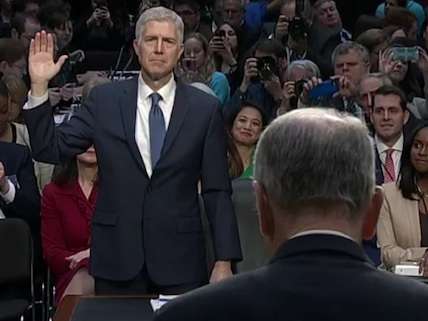Neil Gorsuch Officially Confirmed to the U.S. Supreme Court
How the new justice will impact the future of SCOTUS.

Neil Gorsuch has been officially confirmed to the U.S. Supreme Court by a final vote of 54-45 in the U.S. Senate. The 49-year-old jurist will now fill the vacancy created by the death of Justice Antonin Scalia last year.
Today's vote came as the culmination of a bitter partisan fight that has transformed the way in which the Senate will do business on Supreme Court nominations going forward. After the Democratic minority mounted a filibuster this week against Gorsuch, Senate Republicans triggered the so-called nuclear option, a fundamental change in Senate procedural rules that has effectively killed all future filibusters for all future SCOTUS nominees (Senate Democrats "nuked" the filibuster for lower court nominees in 2013). Exactly how this post-nuclear landscape will shape the next Supreme Court confirmation battle remains to be seen.
Neil Gorsuch will join a Court that is narrowly split along ideological lines. In the near term, his presence is unlikely to disturb that status quo. What that means is that the Court, at least for now, is likely to remain divided 5-4 in cases dealing with such hot-button issues as abortion rights, affirmative action, campaign finance, and gun control. Yes, Gorsuch will be the new kid on the block, but the justice to watch in those sorts of cases will still be perennial tie-breaker Anthony Kennedy.
But what about those areas of the law in which the Court does not divide along predictable conservative-liberal lines, such as criminal justice? For example, the late Justice Scalia was widely admired by criminal justice reformers for his opinions in Fourth Amendment cases. As Scalia himself once put it, "I have defended criminal defendants' rights—because they're there in the original Constitution—to a greater degree than most judges have." By contrast, liberal Justice Stephen Breyer typically reaches the opposite result in such cases and tends to rule in favor of prosecutors and police. Indeed, from a civil libertarian point of view, Justice Breyer is terrible on the Fourth Amendment. Meanwhile, another liberal justice, Sonia Sotomayor, is a Fourth Amendment champion who usually sided with Scalia. Where will Neil Gorsuch fit in? Given his record, I would not be surprised to see Gorsuch coming down on the Scalia-Sotomayor side of this divide, rather than on the Breyer side.
Gorsuch is especially well-poised to have a lasting impact on the Court when it comes to the issue of Chevron deference, a far-reaching legal doctrine that takes its name from the Court's 1984 decision in Chevron U.S.A., Inc. v. Natural Resources Defense Council. According to Chevron deference, when the federal courts are confronted with an "ambiguous" statute, the default position is for federal judges to defer to the statutory interpretation favored by the executive branch agency charged with enforcing that statute. "Federal judges—who have no constituency—have a duty to respect legitimate policy choices made by those who do," argued Justice John Paul Stevens in his Chevron majority opinion. "While agencies are not directly accountable to the people, the Chief Executive is, and it is entirely appropriate for this political branch of the Government to make such policy choices." Chevron, in other words, instructs the courts to tip the scales in favor of the executive branch.
Chevron is a well-established Supreme Court precedent, but it does have its critics. Most notably, Justice Clarence Thomas has taken aim repeatedly at what he sees as the ruling's unconstitutional aggrandizement of executive branch agencies. Chevron "wrests from Courts the ultimate interpretative authority to 'say what the law is,'" Thomas complained in Michigan v. EPA, "and hands it over to the executive." That sort of judicial disarmament "raises serious separation of powers questions."
Thomas will now have an important ally on this front. Writing last year in the 10th Circuit case of Gutierrez-Brizuela v. Lynch, Neil Gorsuch lambasted Chevron deference as a "judge-made doctrine for the abdication of the judicial duty." According to Gorsuch, "under any conception of our separation of powers, I would have thought powerful and centralized authorities like today's administrative agencies would have warranted less deference from other branches, not more." It seems extremely likely that Thomas and Gorsuch will join forces on the bench in an effort to get Chevron overruled.
One of the biggest questions going forward will be Gorsuch's stance in the inevitable cases that will arise from President Donald Trump's expansive exercises of executive power in both foreign and domestic affairs. Will Justice Gorsuch act as a check on the president who picked him? We will find out soon enough.


Show Comments (40)